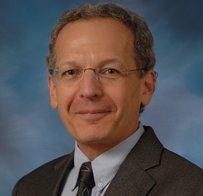Samuel Klein

Samuel Klein M.D. is the William H. Danforth Professor of Medicine, Director of the Center for Human Nutrition, Director of the Center for Applied Research Sciences, Chief of the Division of Geriatrics and Nutritional Sciences, and Medical Director of the Weight Management Program at Washington University School of Medicine in St. Louis, Missouri. Dr. Klein received an MD degree from Temple University Medical School in 1979 and an MS Degree in Nutritional Biochemistry and Metabolism from the Massachusetts Institute of Technology in 1984. He completed residency training in Internal Medicine and a Clinical Nutrition fellowship at University Hospital in Boston, a National Institutes of Health Nutrition and Metabolism Research fellowship at Harvard Medical School, and a Gastroenterology fellowship at The Mt. Sinai Hospital in New York. He is board certified in Internal Medicine, Gastroenterology, and Nutrition.
Dr. Klein is past-president of the North American Association for the Study of Obesity and the American Society for Clinical Nutrition, and inaugural chair of the Integrative Physiology of Obesity and Diabetes NIH study section. He was elected to the American Society for Clinical Investigation in 1996 and to the American Association of Physicians
in 2008. Dr. Klein has had consistent R01 funding from the NIH since 1990, and has published more than 300 papers in nutrition, metabolism, and obesity. He has received numerous awards for his research, including the American Gastroenterological Association (AGA) Miles and Shirley Fiterman Foundation Award in Nutrition and the AGA Masters Award for Outstanding Achievment in Basic or Clinical Research in Digestive Sciences, the Daniel P. Schuster Distinguished Investigator Award in Clinical and Translational Science from Washington University School of Medicine, The Academy of Science-St. Louis Award for Outstanding Achievement in Science, and The Obesity Society TOPS Research Achievement Award.
Dr. Klein's research activities are focused on understanding the mechanisms responsible for metabolic dysfunction associated with weight gain and obesity, and the pathophysiology of nonalcoholic fatty liver disease.
Metabolically normal and abnormal obesity and aging
Aging can be conceptualized as the result of two interactive and overlapping processes, known as primary and secondary aging; these factors overlap and it is impossible to completely separate each one. Primary aging or “intrinsic senescence” is the progressive deterioration in physical structure and biological function that occurs with advancing age alone, independent of other factors. For example, changes in body composition (i.e. decreased bone mineral density, decreased muscle mass, and abdominal fat accumulation), and progressive decline of cardiac, pulmonary, renal and immune function occur normally with increasing age. Secondary aging is the accelerated deterioration in organ structure and function that is mediated by diseases, such as diabetes and hypertension, or harmful lifestyle factors, such as excessive sun exposure or smoking tobacco. Accordingly, body fat gain and obesity represent an important intersection between primary and secondary aging. Moreover, obesity is an important cause of accelerated aging and frailty in older adults because of its increasing prevalence and association with multiple aging-related cardiometabolic abnormalities (including insulin resistance, diabetes, dyslipidemia, increased blood pressure and metabolic syndrome), non-infectious inflammation (involving adipose tissue macrophages and lymphocytes and joints). However, not all obese persons have obvious metabolic and inflammatory abnormalities. It is estimated that about 25% of obese adults are "metabolically normal", usually defined by some measure of insulin sensitivity or having ≤1 cardiometabolic abnormality.





